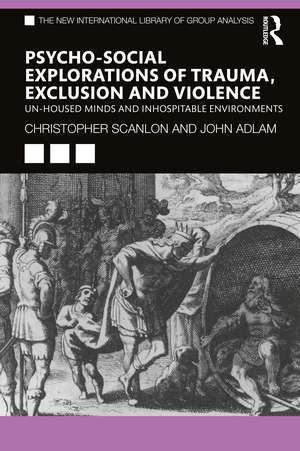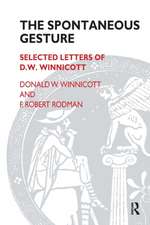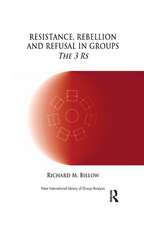Psycho-social Explorations of Trauma, Exclusion and Violence: Un-housed Minds and Inhospitable Environments: The New International Library of Group Analysis
Autor Christopher Scanlon, John Adlamen Limba Engleză Paperback – 25 feb 2022
| Toate formatele și edițiile | Preț | Express |
|---|---|---|
| Paperback (1) | 233.65 lei 3-5 săpt. | +16.80 lei 6-10 zile |
| Taylor & Francis – 25 feb 2022 | 233.65 lei 3-5 săpt. | +16.80 lei 6-10 zile |
| Hardback (1) | 1099.95 lei 6-8 săpt. | |
| Taylor & Francis – 25 feb 2022 | 1099.95 lei 6-8 săpt. |
Din seria The New International Library of Group Analysis
-
 Preț: 230.42 lei
Preț: 230.42 lei - 5%
 Preț: 244.41 lei
Preț: 244.41 lei - 5%
 Preț: 259.32 lei
Preț: 259.32 lei - 5%
 Preț: 196.05 lei
Preț: 196.05 lei - 5%
 Preț: 266.07 lei
Preț: 266.07 lei -
 Preț: 245.94 lei
Preț: 245.94 lei -
 Preț: 265.74 lei
Preț: 265.74 lei - 5%
 Preț: 235.85 lei
Preț: 235.85 lei - 5%
 Preț: 232.85 lei
Preț: 232.85 lei -
 Preț: 248.90 lei
Preț: 248.90 lei - 5%
 Preț: 236.26 lei
Preț: 236.26 lei -
 Preț: 246.79 lei
Preț: 246.79 lei - 5%
 Preț: 261.12 lei
Preț: 261.12 lei -
 Preț: 266.37 lei
Preț: 266.37 lei -
 Preț: 244.25 lei
Preț: 244.25 lei - 5%
 Preț: 217.54 lei
Preț: 217.54 lei - 18%
 Preț: 815.78 lei
Preț: 815.78 lei - 5%
 Preț: 288.98 lei
Preț: 288.98 lei - 17%
 Preț: 240.99 lei
Preț: 240.99 lei - 15%
 Preț: 208.43 lei
Preț: 208.43 lei - 5%
 Preț: 1087.67 lei
Preț: 1087.67 lei - 5%
 Preț: 292.07 lei
Preț: 292.07 lei - 5%
 Preț: 385.17 lei
Preț: 385.17 lei - 5%
 Preț: 284.35 lei
Preț: 284.35 lei - 5%
 Preț: 334.82 lei
Preț: 334.82 lei - 5%
 Preț: 256.60 lei
Preț: 256.60 lei - 17%
 Preț: 220.97 lei
Preț: 220.97 lei - 18%
 Preț: 813.45 lei
Preț: 813.45 lei - 16%
 Preț: 248.72 lei
Preț: 248.72 lei - 16%
 Preț: 224.90 lei
Preț: 224.90 lei - 5%
 Preț: 289.55 lei
Preț: 289.55 lei - 5%
 Preț: 333.19 lei
Preț: 333.19 lei - 5%
 Preț: 293.95 lei
Preț: 293.95 lei - 18%
 Preț: 813.45 lei
Preț: 813.45 lei - 18%
 Preț: 818.15 lei
Preț: 818.15 lei - 18%
 Preț: 814.77 lei
Preț: 814.77 lei - 21%
 Preț: 223.29 lei
Preț: 223.29 lei - 18%
 Preț: 817.86 lei
Preț: 817.86 lei
Preț: 233.65 lei
Preț vechi: 245.94 lei
-5% Nou
44.75€ • 45.66$ • 37.65£
Carte disponibilă
Livrare economică 05-19 februarie
Livrare express 21-25 ianuarie pentru 26.79 lei
Specificații
ISBN-10: 0367893312
Pagini: 214
Dimensiuni: 156 x 234 x 23 mm
Greutate: 0.46 kg
Ediția:1
Editura: Taylor & Francis
Colecția Routledge
Seria The New International Library of Group Analysis
Locul publicării:Oxford, United Kingdom
Public țintă
Postgraduate and ProfessionalCuprins
Notă biografică
John Adlam is a group psychotherapist and independent researcher, working mainly in the National Health Service, UK. He is a founder member of the Association for Psychosocial Studies and a former Vice President of the International Association for Forensic Psychotherapy.
Recenzii
"This is a profoundly disturbing book in the best sense. Chris Scanlon and John Adlam are known for their highly regarded psychosocial studies into the concept of the mind that is unhoused by trauma i.e those experiences that dismember and dissociate people from communities, creating communities of the excluded. In this rich work, they revisit and reconsider their work, with a lens informed by a deepening awareness of the costs of cruelty; whether by white people to people of colour, men to women and all of us to the very earth we stand on. Scanlon and Adlam stand up for the value of disturbance and dissidence, in a world where what can be said aloud seems to be constrained and people who say the ‘wrong’ thing can be excluded or cancelled as if they should not exist. We can learn from getting closer to the unloved and unloveable and we must do so, if we are not to fragment our minds, our communities and the earth itself. All those who work with excluded should read this book, if only to remind themselves that they are part of the group that excluded the people they claim to want to help. It is not always comfortable to look in a mirror but I think we can all be grateful to Scanlon and Adlam for holding up this particular glass." - Dr Gwen Adshead, consultant forensic psychiatrist and psychotherapist, Broadmoor Hospital, UK
"Here we are given a mirror. In it we see something disturbing and yet hopeful about ourselves. We are confronted with the realization that healing occurs when we see that pain belongs to the collective rather than to the individuals who carry it on our behalf - a deeply knowledgeable, intensely wise, and fiercely ethical exploration of today’s predicament. Also one that points toward hope amidst the wreckage by suggesting how we might re-animate public spaces for reflection, empathy, and understanding." - James Krantz, PhD, Past President, International Society for the Psychoanalytic Study of Organizations
"In this elegantly argued, carefully documented work, Christopher Scanlon and John Adlam offer a refreshing critical angle on some of the most pressing forms of social traumatization and exclusion. Going beyond ‘dispossession’, ‘necropolitics’, and ‘states of exception’ as means of characterizing the social injury wrought by inhospitable neoliberal sovereigns, they deploy a deeply critical, practice-based lens to looking at the suffering in our world produced by colonial and racist structures, mechanisms of dispossession and unhousedness, and ecocidal policies that are exacerbating a global migration crisis. The authors mitigate their disappointment at the persistence of oppression by proposing a blueprint for solidarity around anti-oppressive social action." - Michael O’Loughlin, Adelphi University, New York, USA; co-editor Psychoanalysis, Culture & Society
"Starting from homelessness and ending with ‘race’ this is a study of abjection and shame and of its refusal, the refusal to go quietly into the night and accept your place on society’s outermost margins. Scanlon and Adlam examine the vexed relations between those who are cast out and those who, simply by occupying the position that they occupy, do the casting. This wonderfully imaginative and principled book draws upon a startling diversity of sources to explore the paradoxes and predicaments of structural violence." - Paul Hoggett, co-founder, Climate Psychology Alliance
"Psychoanalysis inaugurated the study of the unknown in human experience. Group analysis added the previously unexplored impact of the social and political context on personal life and relations. Now Scanlon and Adlam incorporate the ecological and architectural aspects of our lives, derived from power relations and inequalities in the distribution of wealth, which lead the casualties of the system to an un-housed, dis-membered, and dis-eased existence. This exceptional book is far from neutrality and a revolutionary contribution. Its reading is a must." - Juan Tubert-Oklander, psychoanalyst and group analyst, Marista University of Merida
"In such a slim and compact travel guide, the authors condense 20 years of working, thinking, writing together and with others to cover a remarkable amount of ground. They shine a light (or perhaps something more like Bion’s beam of intense darkness) on some of the most dangerous fault lines in our fragmenting world: racism, genocide, climate change and the inhospitable environments we create to re-house the unhoused." - Andy Downie, Group-Analytic Contexts, issue 96
"The authors provide a courageous and revolutionary review of the social, political, racial, and ecological crises facing human civilization...[they] propose an unprecedented architectural template for future dialogues to readdress and restructure the spaces we collectively inhabit...this book offers an irridescent image of connecting to our collective pain, rather than disavowing it by splitting it off into the marginalised individuals of society... Reading a book like this could change your perspective on your work. It certainly did for me." - Kate Salucci, International Journal of Forensic Psychotherapy
"...Adlam and Scanlon insist there are important political, ethical and existential lessons for us all, regarding norm rebuking, socially truculent and interpersonally confrontational modes of being-in-the-world, exemplifying strategies of survival that simultaneously subvert and illuminate pernicious dynamics of communal domination and social exclusion. Encompassing these ethical-existential dimensions under the banner of the ‘Diogenes Paradigm’, the authors ... accompany readers to a point where they, too, might seek to ‘reclaim the agora’, as Diogenes did...
Adlam and Scanlon are to be deeply thanked by all of us, working with socially excluded individuals and ostracised groups, for this impassioned and deeply researched study, that ought to bring a renewed moral seriousness and social impetus to the psychosocial therapies...This book deserves to inspire and re-invigorate socially engaged, politically conscious and ethically motivated practitioners, to pay renewed attention to the broader ‘inhospitable environments’ in which they practice and to give serious, urgent thought, to how therapeutic practices and the institutions in which they are embedded, might be fundamentally transformed to redistribute power and material and social resources, permanently interrupting oppressive structures and practices." - British Journal of Psychotherapy
Descriere
The central theme of this book is the operation of intersecting discourses of power, privilege and positioning as they are revealed in fraught encounters between in-groups and out-groups in our deeply fractured world. The authors offer a unique perspective on inter-group dynamics and structural violence at local, societal, cultural, and global levels, dissecting processes of toxic 'othering' and psychosocial (re-)traumatisation.
The book offers the Diogenes Paradigm as a unique conceptual tool with which to analyse the ways in which those of us who come to be located outside or on the margins of dominant social structures are, in one way or another, the inheritors of the legacies of centuries of oppression and exclusion. This analysis offers a distinctive psycho-social re-definition of trauma that foregrounds the relationship between the inhospitable environments we generate and the experiences of un-housedness that we thereby perpetuate.
Written in an engaging and accessible style, Psycho-social Explorations of Trauma, Exclusion and Violence directly addresses pressing global issues of racial trauma, human mobility and climate disaster and offers a manifesto for the creative re-imagining of the places and spaces in which conversations about restructuring and reparation can become sustainable. This is an essential and compelling book for anyone committed to social justice and especially for all practitioners working in health, social care and community justice settings and researchers and academics across the behavioural and social sciences.











